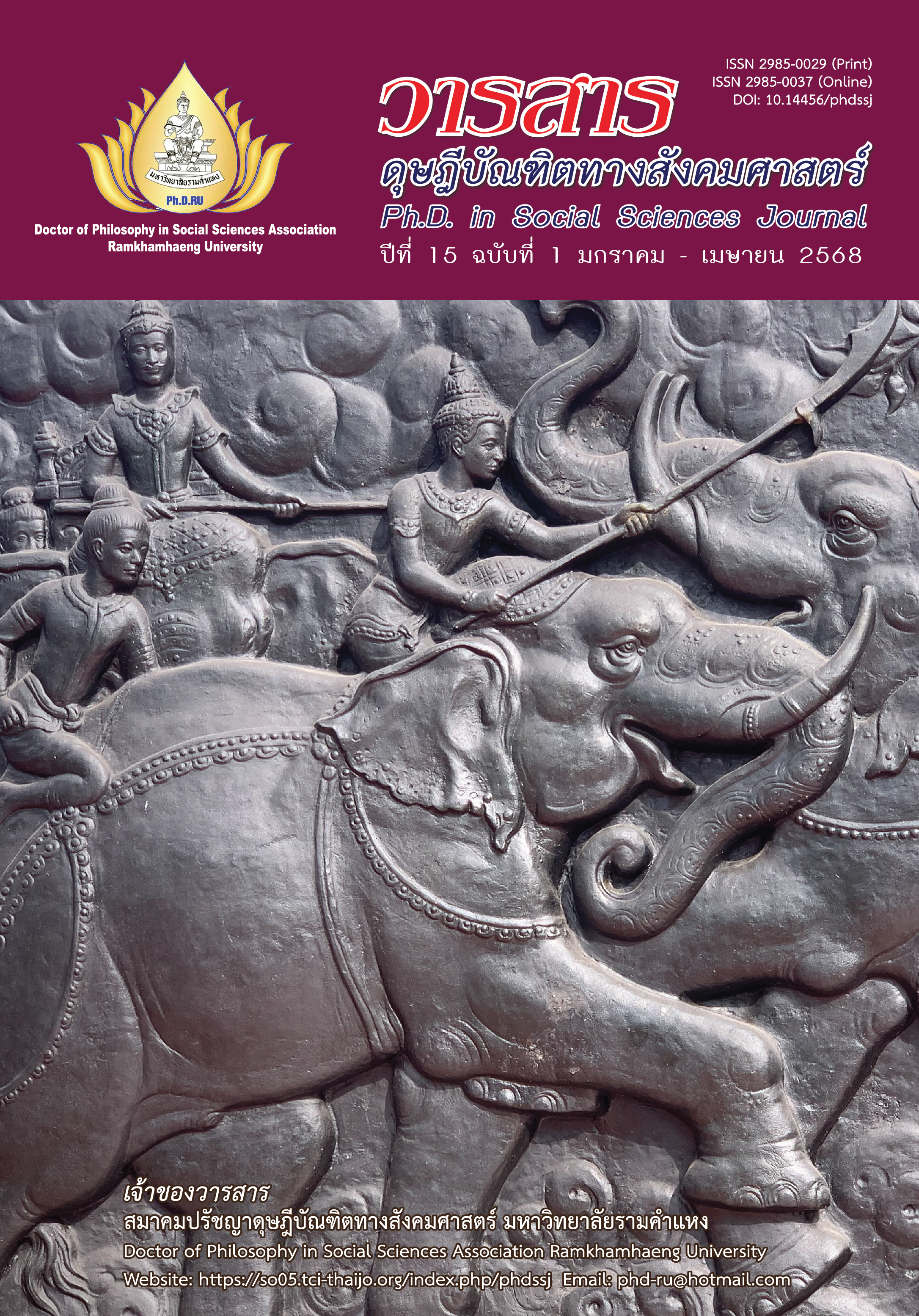HAPPINESS Model (9 Elements of Happiness for Older) A Model of Happiness for Thai Older Workers
Main Article Content
Abstract
This research article aims to study the happiness patterns of older workers. This research used a qualitative research format (qualitative research). The researcher selected key informants in the research. Using in-depth interviews, including a group of 20 elderly workers, using the thematic analysis method.
Findings are as follows: “HAPPINESS Model” consists of (1) Health, (2) Attitude,
(3) Participation, (4) Planning, (5) Income, (6) Networking, (7) Employment, (8) Social-Welfare, and (9) Self-Value.
Article Details

This work is licensed under a Creative Commons Attribution-NonCommercial-NoDerivatives 4.0 International License.
Academic articles, research articles, and book reviews in the Ph.D. in Social Sciences Journal are author’s opinions, and not the publisher’s, and is not the responsibility of the Ph.D. in Social Sciences Journal Philosophy Association, Ramkhamhaeng University. (In the case that research is done on human, the researcher has to be trained in Ethics for Doing Research on Human Training and has to produce the evidence of the training).
References
Bekalu, M. A., McCloud, R. F., Minsky, S., & Viswanath, K. (2021). Association of social participation, perception of neighborhood social cohesion, and social media use with happiness: Evidence of trade-off (JCOP-20-277). Journal of Community Psychology, 49(2), 432-446.
Boontoch, K., & Nuntaboot, K. (2017). Happiness, distress and mental health of the elderly in a community in the upper north region of Thailand. Journal of the Psychiatric Association of Thailand, 62(3), 257-270. [In Thai]
Braun, V., & Clarke, V. (2006). Using thematic analysis in psychology. Qualitative Research in Psychology, 3(2), 77-101.
Charoensak, P. (2024). Happiness for Thai older workers. Doctoral Dissertation of Philosophy (Demography), Chulalongkorn University. [In Thai]
Charoensak, P., & Sukontamarn, P. (2024). Happiness of Thai older workers. In The 2024 National Population Conference (pp. 74-88). Thai Population Association. [In Thai]
Cheytim, A., Prasertsuk, N., & Kerdnaimongkol, U. (2018). The happiness of the eldertyin the Eiderly Club, Bangkok. Integrated Social Science Journal, Mahidol University, 5(1), 85-108. [In Thai]
Gray, R., Chamratrithirong, A., Prasartkul, P., & Pataravanich, U. (2012). Income, debt, cognitive
strategies of acceptance and happiness. Journal of the Psychiatric Association of Thailand, 57(3), 347-356. [In Thai]
Gray, R., Thongthai, V., & Suwannoppakao, R. (2010). Happiness is universal. Mahidol University, Institute for Population and Social Research. [In Thai]
Gray, R. S., Kramanon, R., & Thapsuwan, S. (2008). The determinants of happiness among Thai people: Some evidence from Chai Nat and Kanchanaburi. Thammasat Economic Journal, 26(2), 72-87.
Hwang, E. J., & Sim, I. O. (2021). Association of living arrangements with happiness attributes among older adults. BMC Geriatrics, 21, 100.
Layard, R. (2005). Happiness: Lessons from a new science. Penguin Books.
Muenthaisong, K., Mondee, S., Chancham, P., & Leemanonwarachai, T. (2017). The comparison of the happiness level of people among urban and suburban areas in Mahasarakham. Journal of Humanities and Social Sciences Mahasarakham University, 36(6), 63-76. [In Thai]
National Statistical Office. (2023). Survey of the elderly population in Thailand 2021. Author. [In Thai]
Oswald, A. J. (1997). Happiness and economic performance. The Economic Journal, 107(445), 1815-1831.
Oswald, J. A., Proto, E., & Sgroi, D. (2015). Happiness and productivity. Journal of Labor Economics, 33(4), 789-822.
Sun, Y. (2023). Happiness and mental health of older adults: Multiple mediation analysis. Frontiers in Psychology, 14, 1108678.
Sukontamarn, P., Asadullah, M. N., Photphisutthiphong, N., & Nguyen, Y. T. H. (2023). Happiness in old age: The daughter connection. Journal of Happiness Studies, 24, 1729-1757.
Tadic, M., Oerlemans, W. G. M., Bakker, A. B., & Veenhoven, R. (2013). Daily activities and happiness in later life: The role of work status. Journal of Happiness Studies, 14, 1507-1527.
Teeranupattana, C., & Senasu, K. (2021). Factors affecting happiness: The role of membership with different incomes as a moderator. Journal of Chandrakasemsarn, 27(2), 259-278. [In Thai]
Thumcharoen, W. (2012). The influence of external and internal factors on happiness of the elderly. Master’s Thesis of Science (Applied Statistics), National Institute of Development Administration. [In Thai]
Vachiraphedpranee, S. (2010). Roles of older adults who are happy-living with their families in suburban communities, Nakhon Ratchasima province. The Journal of Boromarajonani College of Nursing, Nakhonratchasima, 16(1), 50-59. [In Thai]
Will, S., & Renz, T. (2022). In debt but still happy? – Examining the relationship between homeownership and life satisfaction. Retrieved from https://www.econstor.eu/bitstream/10419/251792/1/1796833045.pdf
Yang, D., Zheng, G., Wang, H., & Li, M. (2022). Education, Income, and Happiness: Evidence From China. Frontiers in Public Health, 10, 855327.


